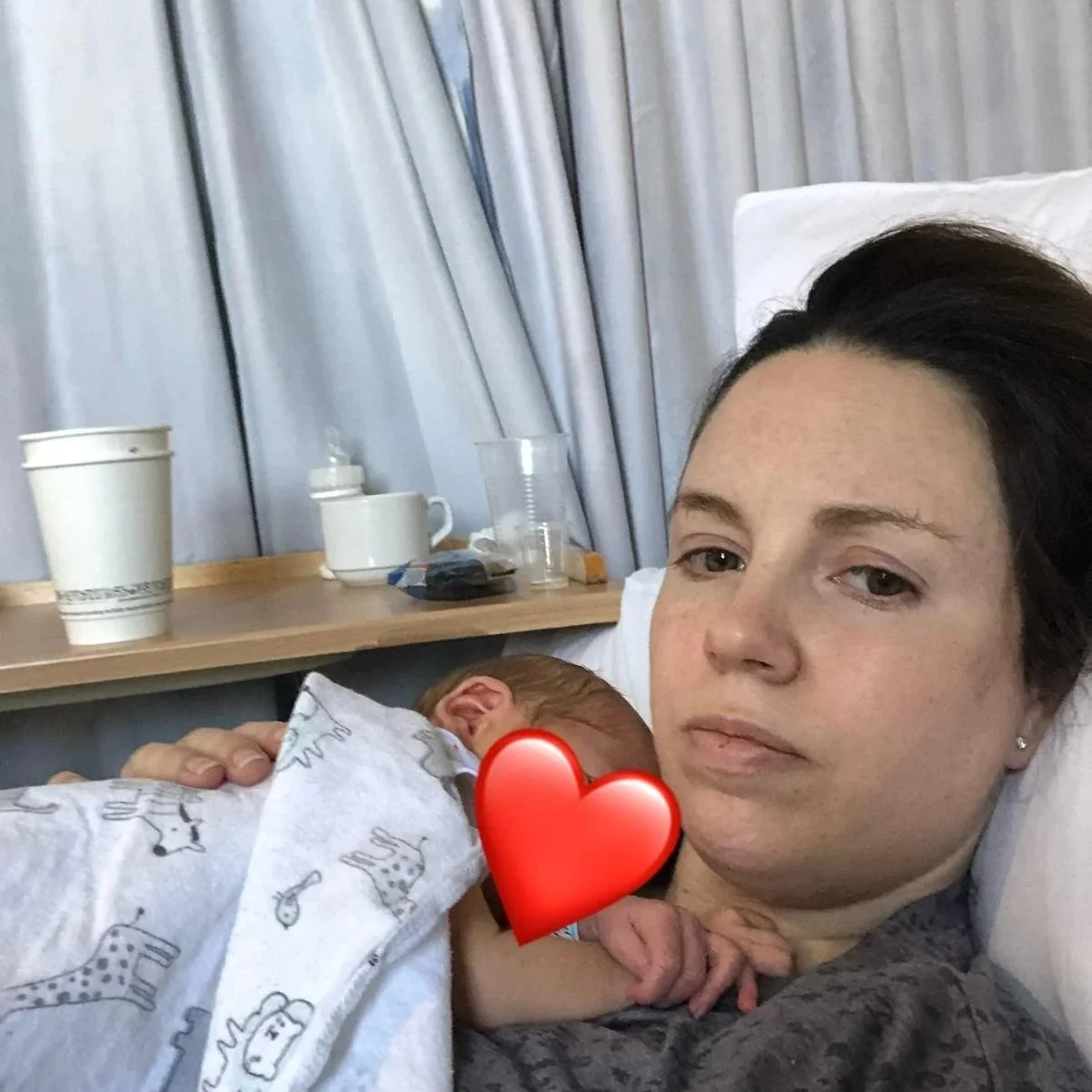When the Dream Turns into a Nightmare: My Postpartum Pituitary Story
Pregnancy is such an exciting time — from the positive result you share with your partner, the scans, telling family and friends your news, and slowly building up to meet the special little one you’ve been growing inside you for almost nine months. The anticipation, the excitement, the hopes, the dreams you have for this baby — the walks you’ll go on together, the trees they’ll climb, their first word, their first smile, their first roll, their first everything. All we want is for our little one to be healthy and happy.
But what if their arrival isn’t the joyful moment you’ve been dreaming of? What happens when your low-risk pregnancy ends in maternal ill health — or even near death? What if your baby’s birth doesn’t go to plan and looks nothing like your carefully written birth plan? Suddenly, your dreams turn into a nightmare. The healthy life you once knew feels out of reach. Now comes uncertainty, fear, pain, and worry. For some, they may be too unwell to meet their baby right away; for others, those first moments together become memories for all the wrong reasons.
Then the excitement of having a newborn takes over. The responsibility of caring for a tiny baby pushes your own health and wellbeing to the bottom of the list. There’s a baby to feed, nappies to change, milk that won’t come in, or perhaps there’s no ‘let down’ so it’s time to start pumping. Maybe baby isn’t latching properly or won’t settle. These are just some of the challenges you might face.
So how do you feel?
I’m exhausted — but aren’t all new mothers exhausted?
How was labour and birth?
It was okay, apart from the headache that came on suddenly and this strange feeling of impending doom. Getting the epidural unnerved me, but I have no idea why.
Has your milk come in yet?
No, but I know it takes a few days. I’ll keep cluster feeding and pumping around the clock. With my first child, it took almost four weeks to establish exclusive feeding. I know what I’m doing — or do I?
Are you in pain?
Yes. The headache is excruciating. It’s so bad I barely notice the pain from giving birth or the cracks in my nipples.
Are you feeling stronger each day?
No. I’m barely functioning and struggle to do the simplest of tasks. I’m not experiencing that rush of euphoria. Something feels off — but I keep going through the motions.
Alarm bells should be ringing by now, but they aren’t. My partner can tell something isn’t right during his short visits (Covid restrictions were still in place). From my WhatsApp messages, he thinks it could be the baby blues. I didn’t have them last time, but maybe this time is different. Postpartum depression isn’t the problem though.
The pain medication barely touches my headache. When it wears off, I cry in pain and ring the bell for more relief. I’m breastfeeding, so paracetamol is all I’m allowed. It takes the edge off — sometimes — but not enough.
Something strange is happening. I’m calling the nurse for help with things I easily managed after my first birth — like getting out of bed or lifting my baby. My obstetrician visits every morning, bringing warmth and optimism. A group of medical students follows him, eager to learn. Occasionally, I become confused, but I try to hide it. I still don’t realise something serious is going on.
My obstetrician is concerned about my headache, so he consults anaesthesiology about the possibility of a spinal fluid leak. Two curious anaesthetists arrive in my room to see how I’m doing. They seem confident that the epidural was a success so they want me to wait a few days to see if my headache subsides. But by now, I’m in agony and crying at the thought of waiting for pain of this magnitude to go away somehow. It’s getting worse - not better. Later that evening, I receive a blood patch, which relieves the pain. Caffeine is also known to help relieve symptoms of a spinal fluid leak so I happily drink caffeinated drinks -day and night! Eventually, I go home — but I’m not the person I used to be. Walking to the car feels like a marathon. I’m weak, tired, and weary.
When Things Still Don’t Feel Right
A few days later, I sense something is still wrong. My aunt comes over and cooks a delicious roast chicken dinner with all the trimmings — such a welcome change from hospital food. I’m so grateful for her kindness. But later, I become nauseous and develop a new, pulsating headache at the back of my head. These symptoms, I can’t ignore.
I return to hospital with my one-week-old baby and am admitted to the postnatal ward. While waiting for a bed, I have blood tests and a Covid swab. I vomit and receive an injection for nausea, which gives me some rest.
The next morning, my blood results show low sodium — maybe because I’ve been sick? Over the next few days, more doctors appear at my bedside — anaesthetists, neurologists — yet I still don’t realise how ill I’ve become. My sodium levels keep falling, and an on-call doctor grows concerned. I’m now confused, irritable, and disoriented. I don’t want anyone near me — not even my beautiful baby. I can’t hold my baby. I’ve never felt so unwell.
The doctor suspects an endocrine issue and calls an endocrinologist.
I’m sent for an MRI, and the experience is terrifying. I see orange dots floating across a black background. I think it’s a screen inside the scanner, but there isn’t one — I’m hallucinating. I’m also nauseous and struggle to keep my tongue still during the scan.
When the results come back, the answer is clear: my pituitary gland is black, and my brain is swollen and grey. That’s why I’m confused and in agony. The diagnosis — lymphocytic hypophysitis, a rare lifelong autoimmune condition — finally explains everything. It’s devastating, but there’s a plan. There’s hope.
Life After Diagnosis
My partner takes our baby home because I’m too unwell to care for anyone — even myself. Treatment begins. Once I’m given steroids, my confusion clears almost instantly. I remember taking 12 pink tablets (Prednisolone) and thinking it seemed excessive — but within minutes, I was sitting up, watching the clock tick second by second for hours. I was suddenly alert again. But what would life be like with a lifelong condition?
Being diagnosed with a pituitary condition is a lot to process for anyone. For a new mother, it’s cruel. People assume hormone replacement therapy makes you feel normal again, but it doesn’t. Some days, I can’t even get out of bed. Even though my doctors are working to optimise my hormones, the postpartum period is full of change — and it takes time for everything to stabilise.
You’re not ready for that walk you dreamed of with your baby — you might not make it back. You can barely care for yourself, let alone document your baby’s milestones. Still, you show up. You put your baby first. You rest when you can.
Daily life now follows a strict schedule of hormone replacements. Two tablets on waking, more at 8 a.m., then more 30 minutes after eating. Another dose at 2 p.m., and the final one at 8 p.m. I drink only for thirst, limit caffeine, and avoid alcohol. I fit my baby’s “eat, play, sleep” routine around my medication. I carry an emergency cortisol injection and teach those close to me how to use it. I keep a medical information pack with me at all times, along with guidelines for sick days and stress dosing. I’ve learned to listen closely to my body — missing a symptom could lead to an adrenal crisis, which could be life-threatening.
I’m incredibly grateful to the doctors and nurses who supported me through my diagnosis and continue to go above and beyond in my care. Finding the Maternal Pituitary Support group has been life-changing — a community of women navigating the same difficult path with courage and understanding. My partner has also been incredible. He may not fully understand my challenges, but he’s been there through it all — juggling full-time work, caring for a newborn, and supporting an unwell wife. He’s done so much research, always searching for ways to help me recover, no matter the odds.
What Should You Look Out For After Your Baby Arrives?
• Blood loss – Did you lose a lot of blood?
• Milk supply – No milk, or if you’ve breastfed before, milk with no ‘let down’?
• Headache – Intense, persistent, or changing with posture?
• Vision problems – Blurred or deteriorating vision.
• Confusion / memory loss.
• Low sodium (hyponatremia).
• Nausea and/or vomiting.
• Changes in urination – Passing large amounts, very little, or very slowly.
• Irritability.
• Fatigue and/or muscle weakness.
Check in with yourself — how are you really feeling?
If after three or six months you’re feeling worse while other mothers seem to be improving, seek medical advice. Symptoms of pituitary failure can vary greatly, and you may have a slow, chronic presentation. When in doubt, talk to your doctor. Pituitary issues are rare — but they can happen to anyone.
For more information about Lymphocytic Hypophysitis: https://maternalpituitarysupport.org/lymphocytic-hypophysitis-explained

